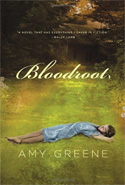by Jesse Montgomery
It is a strange thing to find a book with no sense of humor, and stranger still to realize just how important and comforting even trace elements of a comic sensibility can be. After its fanciful opening, Amy Greene’s debut novel Bloodroot darkens quickly before giving itself over to a wholly untempered seriousness. This seriousness is of the morbid type and it eventually blots out the brighter points of Greene’s capable storytelling.
The novel is a chronicle of the increasingly dire situation of Myra Lamb and her family, a group of hardworking, painfully unlucky Appalachians who, for generations, have made their home on the wild, beautiful and mysterious Bloodroot Mountain (not coincidentally, they themselves are also wild, beautiful, and mysterious). The reader receives the story from a variety of narrators, all in various orbits around Myra, all doomed to suffer incredibly for about 300 pages from various offenses including, but not limited to: unrelenting poverty, thrush, puberty, and being trapped under houses.
In the first third of the novel, which takes place on Bloodroot Mountain, Greene shows off a wonderful ear for dialect and the laudable ability to evoke a Southern mythology with grace and restraint. She sketches a corner of the American South that feels tangible and earthy despite dashes of the fantastic, a sort of whimsical realism.
As the story takes the characters away from the mountain, however, a real meanness creeps in and the plot becomes increasingly leaden and ugly. Here I find fault with the novel. It is not that Greene is wrong to focus on misery in Appalachia (although the depiction sometimes feels abusive in its relentlessness), but her focus is so thorough that the logic of the novel suffers. Whole sections of the book begin to feel disconnected just as she makes her most impassioned case for the determining power and constancy of heredity.
Even for a first novel, Bloodroot is unwieldy. Instead of playing to her strengths—the exultation of her Appalachian mountain—Greene devotes the majority of her energies to detailing cruelty, and the resultant imbalance between quality of description and quantity of description seriously limits the book. Still, Greene is a young writer to watch; her gifts are unique when apparent and the novel does exhibit serious promise.
This post may contain affiliate links.









